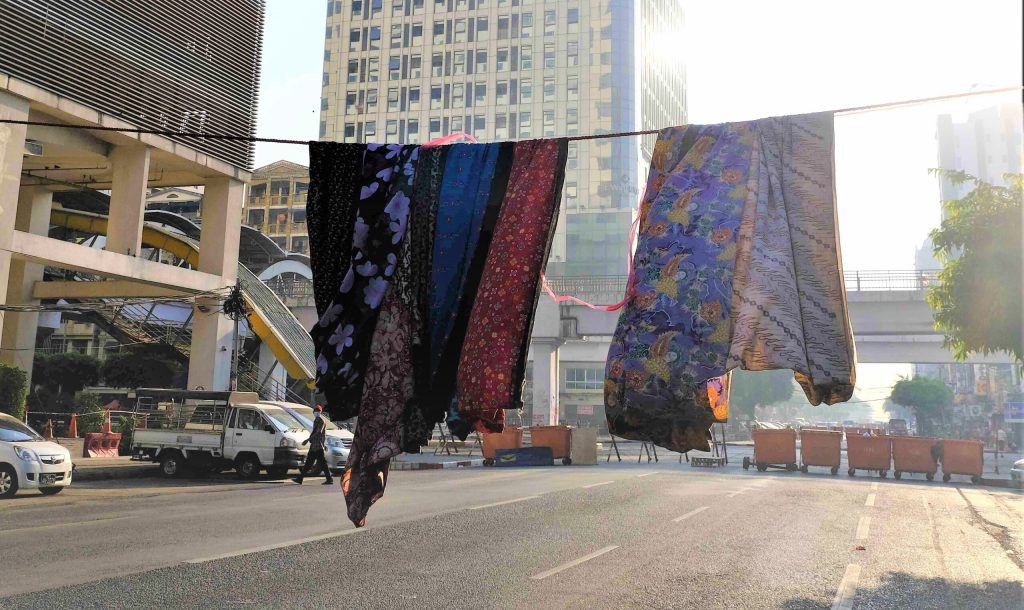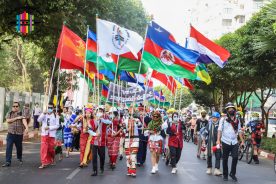As Many as 70 Killed in Protests as Chinese Factory Torched in Myanmar’s Bloodiest Day Since Coup
 Myanmar security forces crack down on protesters in Yangon's industrial suburb of Hlaingthaya, March 14, 2021
Myanmar security forces crack down on protesters in Yangon's industrial suburb of Hlaingthaya, March 14, 2021Myanmar security forces killed 51 protesters in an industrial suburb of Yangon after Chinese-funded factories were torched on Sunday, the bloodiest day in six weeks of protests against the junta that deposed the elected government of leader Aung San Suu Kyi, civic and aid groups said.
The 51 deaths occurred at Hlaingthaya township in Yangon, and another 12 were killed in other townships of Myanmar’s commercial hub and former capital, home to 5.4 million people. At least 24 bodies had been taken to Hlaingthaya Hospital and other remains were kept in family homes, the aid groups said, requesting that their names be withheld for safety reasons.
Earlier the Assistance Association for Political Prisoners (AAPP), which tracks casualties and arrests, said that since the coup “126 people have been killed due to violent and arbitrary crackdowns, at least 38 today.”
“Further casualties will be added when confirmed, casualties are drastically increasing.” said the group.
“We have seen the violence today in (Hlaingthaya) Township and in other places across Yangon and Myanmar,” said British Ambassador Dan Chugg.
The British Government is appalled by the security forces’ use of deadly force against innocent people. We call for an immediate cessation of this violence and for the military regime to hand back power to those democratically elected by the people of Myanmar,” Chugg tweeted.

‘Heartbreaking accounts of killings’
The U.N. Secretary-General’s special envoy on Myanmar, Christine Schraner Burgener, issued a statement saying she “strongly condemns the continuing bloodshed in the country as the military defies international calls, including from the Security Council, for restraint, dialogue and full respect for human rights and fundamental freedoms.”
Burgener has heard directly from people in the country “heartbreaking accounts of killings, mistreatment of demonstrators and torture of prisoners over the weekend,” she said.
“The ongoing brutality, including against medical personnel and destruction of public infrastructure, severely undermines any prospects for peace and stability,” added Burgener.
RFA’s Myanmar Service confirmed the killings of one protester each in northern Kachin state, the central Bago region, and in Mandalay, the country’s second biggest city, with dozens injured and more than 100 arrested. Reuters news agency reported a policeman was also killed in Bago to raise the day’s death toll to 39.
The killings and violence prompted the junta to impose "judicial martial law" in Hlaingthaya and neighboring Shwepyitha township in order to “perform security, maintain the rule of law and tranquility more effectively," AFP quoted state-run television news as saying Sunday night.
Reuters quoted army-run Myawaddy television as saying four garment factories and a fertilizer plant were set ablaze Sunday and about 2,000 protesters had blocked fire engines from reaching them.

Shadow government eyes ‘revolution’
In a dramatic move, the shadow government set up by lawmakers deposed in Feb. 1 coup vowed to back a “revolution” to oust the military leaders who seized power last month over the military said was a fraudulent election that delivered a landslide victory for Aung San Suu Kyi’s National League for Democracy (NLD).
“This is the darkest moment of the nation and the moment that the dawn is close,” Mahn Win Khaing Than said in a video posted on the website and social media of the group, called the Committee Representing Phyidaungsu Hluttaw (CRPH). The group passed a law giving citizens the legal right to defend themselves.
“In order to form a federal democracy, which all ethnic brothers who have been suffering various kinds of oppressions from the dictatorship for decades really desired, this revolution is the chance for us to put our efforts together,” he said.
“We will never give up to an unjust military, but we will carve our future together with our united power. Our mission must be accomplished,” said Mahn Win Khaing Than, acting CPRH vice president and a member of the NLD.
The torching of the Chinese-financed factories came amid rising anti-China sentiment in Myanmar, where protesters accuse Beijing of supporting the coup and are wary of growing Chinese influence, and drew an appeal from China’s embassy in Yangon.
“China urges Myanmar to take further effective measures to stop all acts of violence, punish the perpetrators in accordance with the law and ensure the safety of life and property of Chinese companies and personnel in Myanmar,” said the embassy, according to Reuters.
Among the protester deaths Sunday confirmed by RFA were a 30-year-old jade broker killed in Kachin state, a 20-year-old man from Magway division slain in Bago, and a 23-year-old woman killed in Mandalay.
In the Kachin state capital Myitkyina, the military and police also cracked down on protesters in any form, destroying signs and posters stand on major roads and stifling motorbike rallies and night time prayer vigils for victims. Some 90 people have been arrested in Myitkyina for protesting against the coup, and are being denied family visits to the city prison where they are being held.
In Mandalay, scene of repeated violent crackdowns since the coup, about 20 protesters were arrested, sources told RFA.
The AAPP said that as of Sunday, 2,156 people had been arrested, charged, or sentenced in relation to the military coup, with 1,837 still being held.

Reported by RFA’s Myanmar Service. Translated by Kyaw Min Htun. Written in English by Paul Eckert.









 Hundreds of thousands have continued to protest near-daily across Myanmar, despite crackdowns by the police
Hundreds of thousands have continued to protest near-daily across Myanmar, despite crackdowns by the police